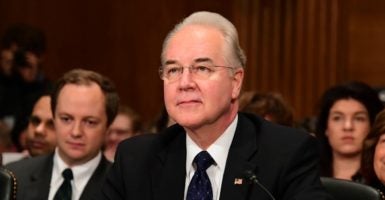On Wednesday, Rep. Tom Price, R-Ga., the nominee to be the next secretary of health and human services, went before the Senate Committee on Health, Education, Labor and Pensions for his confirmation hearing.
During almost four hours of intense questioning, including questions concerning his ownership of health-related stocks, Price’s cool and measured responses demonstrated an impressive grasp of policy and his commitment to restoring the traditional doctor-patient relationship to the center of health care decision-making.
Sen. Johnny Isakson, R-Ga., praised the nominee, and expressed confidence that Price can handle the department’s $1 trillion budget, that he understands the health care industry, and has experience working with the Legislature.
The first day of the Price confirmation hearings, however, highlighted the deeper philosophical and political differences in Congress and the nation at large.
The fate of the Affordable Care Act was the top issue. Sen. Patty Murray, D-Wash., characterized Price’s approach to health reform as “ripping apart” today’s health system, and Sen. Sheldon Whitehouse, D-R.I., chastised congressional Republicans for not having a legislative plan ready to replace the Affordable Care Act, saying: “It’s hard to negotiate with nothing.”
For perspective, it’s worth noting that President Barack Obama’s health plan was not translated into legislative language (the tri-committee bill) until June of 2009, and congressional Republicans had already introduced several major health reform plans, including Price’s Empowering Patients First Act.
Price emphasized that the final language of the replacement legislation—a work in progress—would not only prevent Americans from falling through the cracks, but would also provide more choice, lower costs, and put more decisions in the hands of individuals, families, and states.
Every American, he noted, would have access to affordable care, and competition and choice would drive innovation.
Price focused on the right issue.
In the current debate over replacing Obamacare, Congress must not only address the needs of millions of people subsidized by Obamacare, but also the problems of more than 10 million unsubsidized people in the individual market and the approximately 15 million people in the small group market.
These folks, mostly middle-class Americans, are facing horrendous insurance costs—and huge deductibles. These markets, as Sen. Susan Collins, R-Maine, observed, are also plagued by declining competition and fewer choices. Indeed, a recent Heritage Foundation analysis reported that 70 percent of U.S. counties have only one or two insurers on Obamacare exchanges.
Price agreed with Sen. Rand Paul, R-Ky., that Congress should “legalize” different types of health insurance products, especially lower-cost plans, and allow patients to choose benefit packages that are best for them.
Sen. Bernie Sanders, I-Vt., a self-identified “democratic socialist,” asked Price if he thought that health care was a “right.” Price responded that all Americans should have access to affordable care and that America is a “compassionate society.”
This set Sanders off:
No, we are not a compassionate society. In terms of our relationship, the poor and working people, our record is worse than virtually any other country on earth. We have the highest rate of childhood poverty of any other major country on earth and half of our senior older workers have nothing set aside for retirement. So, I don’t think compared to other countries we are particularly compassionate.
Sanders’ rhetorical explosion was odd given America’s massive income-transfer and welfare programs for poor and low-income people, as well as the heavily subsidized Medicare and Medicaid entitlements.
It is also worth noting that, under federal law, every American has a legal right to be treated in any American hospital receiving federal funding—which is, for all intents and purposes, almost every hospital.
Government monopoly (i.e. “single payer”) health care, long endorsed by Sanders and others, has a record.
In Britain’s premiere National Health Service, patients have historically had to endure long wait lines and periodic funding crises. Recently, in fact, the British Red Cross said that the National Health Service was experiencing a “humanitarian crisis.”
Price told the senators that he wants to work with Congress to “make certain that every American has access to the highest quality care and coverage that is possible” and “put in place a system that gives every person the financial feasibility to be able to purchase the coverage they want for themselves and for their family. Again, not what the government forces them to buy.”
Concerning the government’s health entitlements, Price told the senators that President-elect Donald Trump was sincere in his pledge not to “cut” Medicare, but emphasized that there is vast room for improvement in both Medicare and Medicaid.
The “metric” for the success in these programs, Price insisted, was not money but rather the quality of patient care.
In this context, Price noted that many Medicaid patients have trouble trying to find a doctor to care for them. Indeed, research shows that Medicaid patients often receive a significantly lower quality of care than patients covered by private health insurance.
Likewise, Price reminded the senators that more physicians increasingly will not take new Medicare patients.
America’s doctors, he observed, are struggling with reams of red tape. In fact, the government’s regulatory and reporting requirements are turning doctors into “data entry clerks,” taking precious time and energy away from their primary function of face-to-face patient care.
Next week, the Senate Finance Committee will hold an additional hearing to consider Price’s nomination to lead the Department of Health and Human Services. This is the committee that will vote on Price’s nomination.
Price’s commitment to working across party lines, his openness to alternative policies, and his dedication to restoring the traditional doctor-patient relationship make him an exceptional candidate to be America’s next secretary of health and human services.































